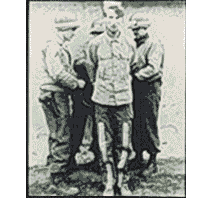
I don't know why I'd never noticed my aunt's hand on my shoulder, or why it should surprise me, except that after so many years the garment of family is so raveled, and the old story in the tapestry of its weave so unreadable. For, I can still see myself walking alone in the hot sun to see her, the last street before hers a great hill of cracked pavement alongside a concrete retaining wall that rose as steeply as the hill. Her two rooms on Grote Street, up one wide flight of stairs, is as present to me almost as the one I grew up in, as though it were my own: the sitting-room/kitchen with a day-bed to the rear and a single narrow window, and then at the front the kitchen, with its two large windows where an obese black cat sat on the sill and Ethel's 90-year-old father looked out and commented wryly in accented English on whatever passed before him, teaching me even then that age could be silly and not wise. I suppose my cousin Howard shared the day-bed with his grandfather and that Marcia slept in the bedroom with her mother in the double bed, where we found Ethel after the telegram came from the War Department and we all stood around her in the small remaining space, Marcia, Ethel, my mother, crying.
My aunt had already suffered the first of our family's unravelings, the death of her husband from tuberculosis, my mother's brother, whom I can remember seeing only once--on our trek to California, at a Sanatorium in Colorado. I saw him across what seemed to me at three a vast distance of grass. I think I may already have grasped that this was the distance of death. He was in a robe on a verandah and waved to us, he was like a shadow, through the dark mist of the screen.

|
In the forties photographs were still an occasion, men put on jackets and ties, women their Sunday dresses; we look like we were doing o.k. here, and probably were. My father and his cousin (Annie's husband) both worked in shipyards; so did Ethel. She would come home from work with her lunch pail, in slacks, and her hair tied up in a kerchief knotted in front and folded over like a turban. The shipyards seemed to liberate my aunt. She took in a border, a young woman from work, whose husband was in the army, who couldn't live without men. And my aunt herself in the shipyards found herself a young lover, and it's hard to believe that she didn't know that eventually he'd leave her and marry. But she was as good humored as she was tall and stout, and her laughter was irrepressible, like a fountain rising up into the sunlight from the ocean floor and all its darknesses. She really didn't have the approval of most of her husband's sisters--there were five of them--but for reasons which seemed to antedate anything I could know or see. For example, they didn't like her choice of friends. Not that they didn't have good words for some of these friends--it's just that they weren't Jews but Italians. But they weren't ready, my aunts, in their generation, and too close to the war against the Jews in Europe, to see the resemblances between Jews and Italians. But for me Ethel opened spaces in the close weave of family and attitude, and I admired her, this I now realize, and between us there was affection and familiarity of touch and gesture, and this I'd forgetten, so long ago did all these things happen.